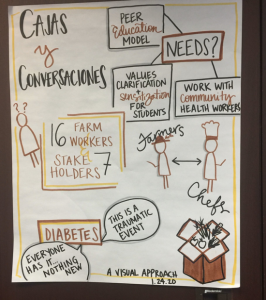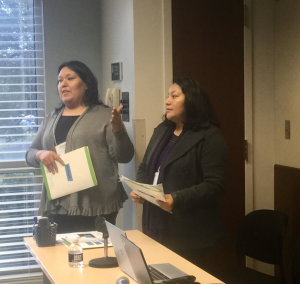A deeply inspiring keynote. A series of participatory workshops and presentations that were both intellectually and emotionally engaging. A networking lunch buzzing with the energy of new connections. A reflective closing panel. Real-time visual documentation throughout the day. These were the building blocks of the 2020 Connect, Engage, Transform: Rural Community Partnerships Conference.
But the real power of the conference was in the details.
Have you ever pondered the role of libraries in preserving local histories?

How about the role of peer education in addressing Type II diabetes among North Carolina’s farmworkers?


Dr. Dorian Burton, Ed.L.D., launched the day with a challenge: “What’s your purpose?” he asked the audience. “What will be your legacy? Wake up and tell yourself that you have the opportunity to change someone’s life.”

The day unfolded as a response to those questions. Presenter teams, each representing UNC-Chapel Hill and rural North Carolina, shared professional and community achievements that resulted from sustained academic-community partnerships.
Communities have assets, Dr. Burton reminded attendees at the start of the day. It’s the University’s job to appreciate those assets and respectfully ask for a seat at the table.
Every presentation echoed that sentiment.
In one workshop, Kim Pevia, a community organizer in Robeson County, explained the importance of sharing one’s own story with the people you’re trying to study or “help.”
“Once you sit in a circle with a subject, they are no longer a subject; they are a human being,” she said.
To practice this concept, participants gathered in small groups and shared three-minute personal stories with each other.

Maureen Berner and Anita Brown-Graham of the UNC School of Government, and Calvin Allen of Rural Forward NC, facilitated a workshop titled “Values That Matter: Five Don’ts When Working in Rural Communities.” Some key takeaways:

“Don’t forget to fully wrap up a project with a future sustainable plan for the community.”
“Don’t have an end goal of using information purely for academic purposes. Consider developing products that can also be used by the community!”

In a separate session, a community organizer representing Edgecombe County, NC, presented the products her community had requested as an outcome of her research partnership with UNC Gillings School of Global Public Health.
The project, a collaboration between Gillings’ Shelley Golden and Vichi Jagannathan of Rural Opportunity Institute, is addressing long-term effects of childhood trauma in eastern NC. Community-driven outcomes include an informative podcast featuring interviews with local law enforcement officers.

The day ended on a high note.
“We’re committed to staying focused on rural community partnerships in North Carolina,” CCPS director Lynn Blanchard said as she addressed the crowd in the closing session.
Though the conference lasted only a day, it formed a foundation for attendees to carry forward the ideas exchanged and relationships formed.
Attendees connected with one another in meaningful, cross-disciplinary conversations. They engaged with a rich variety of presentations and workshops.
Transformation is harder to observe in real time. However, attendees left the Friday Center that afternoon imbued with renewed confidence in their ability to make a positive change through their work — in the words of community health worker Alice Schenall, “serving where I’m most needed.”


